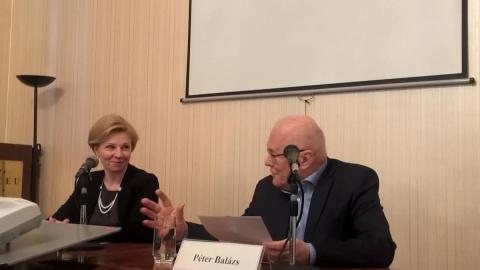Event report - "Ukraine-EU Relations in the Changing World: Challenges and Opportunities”

The CEU Center for European Neighborhood Studies and the Embassy of Ukraine to Hungary, in the framework of its Ambassadorial Lecture Series, hosted a public lecture on 20 March 2017 entitled “Ukraine-EU Relations in the Changing World: Challenges and Opportunities” delivered by H.E. Ms. Liubov Nepop. The lecture was attended by a distinguished group of students, diplomats and academics.
In her opening remarks, Ambassador Nepop said that today it is almost impossible to imagine that history of any European state can be separated from the destiny of our continent. At the same time, the destiny of Europe can’t be separated from the ongoing global processes. She further emphasized that the European Union for Ukraine is not only a union of democratic states, but a symbol of free and prosperous life; a symbol of dignity and solidarity.
Ambassador further referred to the events that took place in Ukraine in the autumn of 2013. This was the time when Ukrainians went to the streets to defend the Association Agreement after the government had made a decision not to sign it. The Agreement was so important for the people because it became a symbol of the European future and not signing it meant depriving future generations of their more prosperous future. It also suggested that the Ukrainians did not want to become part of the Russian Empire again.
The second part of the talk was principally about the security situation in Ukraine. Ambassador stated that Russia illegally annexed Ukrainian Crimea almost exactly 3 years ago, on 18 March 2014. In the spring of 2014, Russia started a war in the east of Ukraine and approximately 10,000 people already lost their lives. At least 118 Ukrainians remain hostages and more than 400 people disappeared. Despite the Normandy format and Minsk agreement, there is no permanent ceasefire in the region. From the end of January security situation deteriorated after clashes initiated by the Russia backed separatist. Ambassador stressed that security of the EU depends on the security of Ukraine. What does the EU can do in this respect? First, continue and enhance sanctions; second, launch the OSCE police mission; third, introduce a new format on the de-occupation of Crimea.
The third part concerned the energy policy. Ambassador Nepop said that Russia used the energy as a weapon against Ukraine while Ukraine was dependent on Russian gas. In 2013, Ukraine was buying almost 100% of gas from Russia, whereas in 2016 the country stopped purchasing it completely.
Among other important elements of the EU-Ukraine relations, Ambassador mentioned deep and comprehensive free trade area, which is provisionally being applied from 1 January 2016 and expressed her hope that visa free regime for Ukrainians would be introduced this summer.
Ambassador finished her speech by pointing out that both Ukraine and the EU should use the existing tools and possibilities to boost cooperation and open new ways for implementing the strategic Ukrainian goal, which is European integration. She stressed that Russian aggression is not only Ukrainian, but a global problem.
The lecture was chaired by Péter Balázs, Director of CENS and former Hungarian Minister of Foreign Affairs and was followed by a lively question and answer session.
